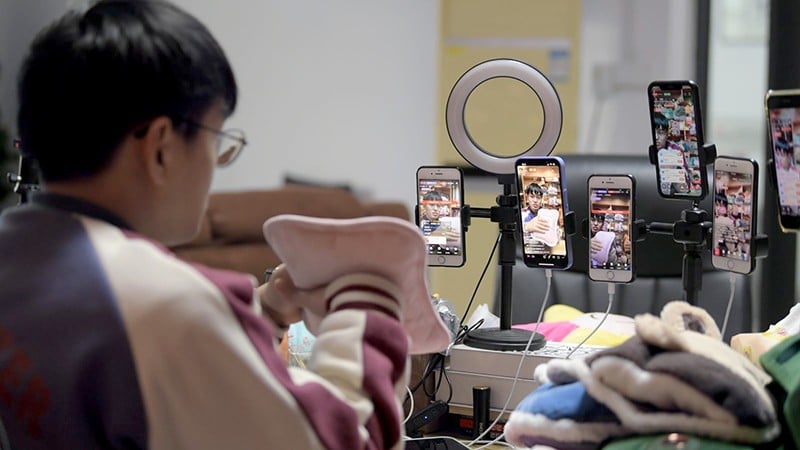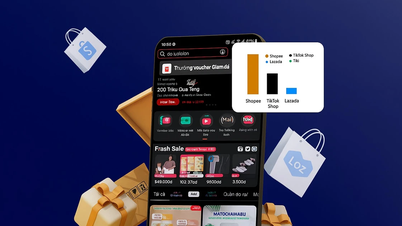Faced with pay cuts, long working hours and fierce competition, China's livestreaming sellers are pessimistic about their job prospects in a saturated industry.
 |
| Salespeople are concerned about their job prospects in an increasingly saturated and competitive field. |
As of March 2023, Hou Chunyu spends four hours a day livestreaming to sell fiber supplements on Douyin, TikTok’s sister app. Sometimes, she works past midnight.
“This [supplement] contains eight types of fiber, as well as different vitamins and minerals,” the 24-year-old repeats every few minutes, referring to her imaginary audience as “babies.”
“Even astronauts use this amazing stuff. Why don’t you give it a try?” - Livestream shopping, which has become wildly popular in China due to the pandemic, was once a booming industry – with nearly half of the country’s internet users buying from livestreaming sellers by mid-2023.
- But the live-streaming shopping bubble has started to deflate this year. Faced with falling wages, longer hours and increased competition, sellers are questioning their job prospects in the industry.
- E-commerce companies have also started experimenting with AI livestreamers to cut costs, making the job market even more precarious.
|
But by the end of March, Hou had not sold a single product. Her live stream had only four viewers – two of whom were her colleagues. Hou said she felt like she was speaking in front of a mirror – trying to get feedback from her audience but only hearing her own voice. Despite being paid 12,000 yuan ($1,642) a month, Hou decided to quit.
“I would have a mental breakdown if I continued doing this,” she said.
Dream of changing life...
When Hou first started selling via livestream in mid-2021, the industry was booming—partly due to China’s coronavirus-free lockdown, which forced millions to stay home and shop on their mobile phones. While still relatively new to the West, live-streaming was already popular in China, where nearly half of internet users opted for live-streaming as a shopping option by mid-2023. One of China’s biggest stars was Austin Li, dubbed the Lipstick King, who once sold billions of dollars worth of products in a single day. The dream of instant fame and fortune has driven many young women into the industry, working for small e-commerce companies in
the world’s most populous country.
Competition and pressure
But the e-commerce bubble has shown signs of deflating recently, as the saturated industry faces an
economic downturn. Fed up with falling wages, longer hours and growing competition for frugal Chinese consumers, livestreamers are starting to worry about their job prospects in the industry. Hou, a broadcast journalism major, moved to Hangzhou in 2022 to join livestreaming, lured by the lucrative promise of work in a city that is China’s e-commerce hub. She works four hours a day, 26 days a month for a salary of more than 10,000 yuan ($1,390) — double the average income of new college graduates. But in 2023, the job market became tougher, with many companies cutting salaries to $821–$1,095 and requiring their employees to work eight hours a day. As companies went bankrupt, Hou changed jobs frequently. A clothing company laid off all its employees six days after she joined. Li Bing, 23, from Zhoushan, who sells toilets and bathroom sinks for a home appliance company, is in a similar situation. Although she earned as much as $2,053 a month in 2022, her income is now just $1,095 a month. He Zi, 26, from Hangzhou, said her monthly income has dropped by 5,000 yuan compared to last year. Livestream sellers’ incomes are set to fall by about 30% from 2022 to 2023 in major cities like Hangzhou, Shanghai and Beijing, according to Chinese consultancy iiMedia Research. Amid a slowing economy, Chinese consumers are becoming more cautious about spending and are more inclined to buy cheaper goods. Unlike a year ago, when customers struggled to place orders whenever a product was listed on a livestreamer’s channel, Li said they are now much more selective.
“You need to convince them with the most sincere tone. The work now is not only physically tiring but also mentally torturous,” she said. As consumers spend less and sales decline, companies are making up for the losses by increasing the workload of employees, making livestream selling more competitive, demanding and stressful. Sharon Zhang, a 23-year-old who recently left her job as a livestream sales representative at a top cosmetics company in Hangzhou, said her working hours were increased in the first half of 2023 and her team’s salaries were drastically cut. Amy Wang, a livestream host in Dalian, said that sales representatives at her company were forced to continue talking even when there was no audience watching. They were not allowed to pause for more than five seconds and had to extend their live stream if the viewership reached a certain level – her longest live stream lasted eight hours.
“My head was buzzing after saying the same thing over and over all day,” Wang said.
“I felt like a lab rat running on a treadmill.” Rui Ma, a Chinese tech analyst, said livestream sellers were facing greater pressure and competition due to market saturation. The number of livestreaming channels on Chinese platforms has increased fivefold from 2020 to 2022, according to Chinese market research firm Zhiyan Consulting. From 2020 to 2021, when livestream shopping was booming in China, retailers were willing to offer deep discounts and pay large sums just to get their products on sales channels, according to Leo Li, a tech headhunter in Hangzhou. Livestreaming companies have mushroomed and are competing for highly paid hosts. But retailers are now offering fewer discounts and paying livestreamers a smaller share of profits, Li said. At the same time, more young college graduates are joining the industry after witnessing its boom, leading to further declines in wages. To cut costs, e-commerce companies have begun experimenting with AI livestreamers, making the job market even more precarious. Nanjing-based startup Silicon Intelligence lets customers create their own custom AI livestreamers or use the company’s pre-trained livestreamers for a monthly subscription of just $753. Livestream sellers say the tough conditions have forced them to leave the industry. Wang worked at four different companies, selling everything from thermos bottles to underwear. Each stint lasted about one to three months. After her second month at a company selling pig trotters, Wang and her remaining colleagues were laid off, citing insufficient profits. She is now taking a break from livestreaming, helping out at her parents’ restaurant while looking for other opportunities. But in a tough job market, livestreaming may still be the best option. One in Guangdong, who sells home decor and baby products, said she chose the job because it offers a more flexible schedule and allows her to dress nicely for work.
“As a fresh graduate, livestreaming sales jobs actually pay better than many other jobs,” said the 26-year-old, who asked to remain anonymous due to privacy concerns. In August, Hou quit another livestreaming job—this time at an automotive lubricant company—after her boss extended her working hours and cut her vacation days. She said she wasn’t sure whether she should look for another job in the industry: Her current job pays better than others, but she’s exhausted. Hou said she’s losing hair and losing sleep due to the stress of not meeting her sales goals; even when she can sleep, she replays the sales pitch in her dreams.
“Before I took this job, I thought it would feel like I was performing on stage, under the spotlight,” she said. “After I started working, I realized it was really robotic, boring and dull.”




![[Photo] Prime Minister Pham Minh Chinh chairs the second meeting of the Steering Committee on private economic development.](https://vphoto.vietnam.vn/thumb/1200x675/vietnam/resource/IMAGE/2025/11/01/1762006716873_dsc-9145-jpg.webp)











































































































Comment (0)